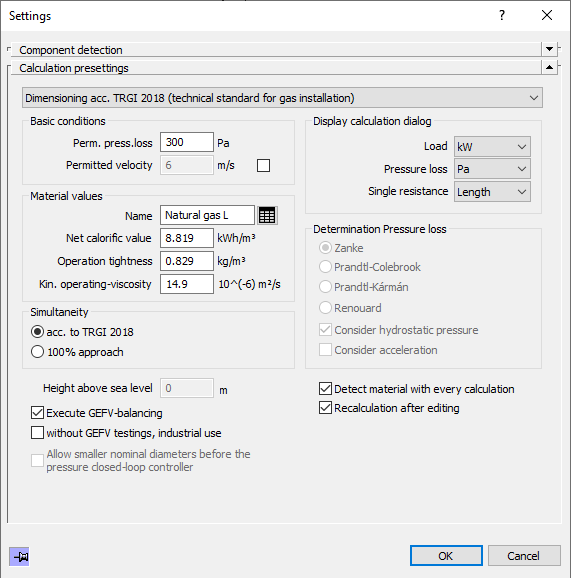Details of Calculation Presettings in the Settings Gas
Information about the section Calculation presettings in the Settings dialog in the gas pipe network calculation.
In this dialog you can determine global settings for calculation. The settings are saved with the project.
You are here:

Calculation basis
Select the desired Calculation method using the drop-down list. Depending on the selected method, different settings are at your disposal.
Basic conditions
Enter the permitted pressure loss and the permitted velocity. To change the permitted velocity, activate the checkbox.
Display Calculation Dialog
Enter the units to be used for displaying load, pressure loss and single resistance in the calculation dialog, in results and in printouts.
Material values
The gas type and its material values depend on the selected calculation method. When using Dimensioning acc. general method the gas type can be chosen and by entering material values be freely defined. If you enter material values in this dialog, the input is saved with the project. If you create the new gas type in the dialog Material values, it will also be available for other projects.
| Element | Meaning |
|---|---|
| Name | When using Dimensioning acc. general method, the name can be changed. The input is saved with the project. |
 Material value table | With Dimensioning acc. general method, the dialog Material values allows you to select the gas type or to create a new gas type. The values are saved in the table. |
| Nominal calorific value | Display of nominal calorific value for the selected gas type. When using Dimensioning acc. general method, the nominal calorific value can be changed. The input is saved with the project. |
| Nominal density | Display of nominal density of the selected gas type. When using Dimensioning acc. general method, the nominal density can be changed. The input is saved with the project. |
| kin. operating viscosity | Display of kinematic operating viscosity of the selected gas type. For Dimensioning according to the general method, Dimensioning according to TRF 1996, Dimensioning according to ÖVGW F G61 and Dimensioning according to TRGI 2018, the kinematic operating viscosity can be entered freely. The input is saved with the project. |
Determination Pressure loss
Depending on the selected calculation method, the section Determination Pressure loss offers different options.
Whether settings can be changed depends on the selected dimensioning method. Settings that can not be changed with the selected calculation method are deactivated.
| Element | Description |
|---|---|
| Zanke Prandtl-Colebrook Prandtl-Kármán Renouard | Select the method to determine pressure loss. |
| Consider hydrostatic pressure | Enabled: Pressure losses or pressure recoveries due to gravitational forces are also considered during dimensioning. If the gas used is lighter than air and the consumers are positioned higher than the house service connection, pressure recovery is possible and the pipes will be dimensioned smaller accordingly. If the gas used is heavier than air and the consumers are positioned higher than the house service connection, this height difference must be overcome additionally. |
| Consider acceleration | Enabled: Considers the dynamic pressure change per section part caused by changes of volume flow rates and dimensions over the course of a flow path. |
Simultaneity
The simultaneity of consumers in flow paths can be set according to the rules of the TRGI 2018 or according to a 100 %-approach.
Whether settings can be changed depends on the selected dimensioning method. Settings that can not be changed with the selected calculation method are deactivated.
| Element | Description |
|---|---|
| acc. to TRGI 2008/TRF 2012 | Enabled: The simultaneity of consumers in flow paths will automatically be set according to the rules of TRGI 2008/TRF 2012. |
| 100 % approach / user defined | Enabled: A simultaneity of 100 % is initially assumed for all consumers in flow paths. Simultaneity for individual consumers can be edited using the function Edit flow paths in the Calculation dialog. |
General Setting
Whether settings can be changed depends on the selected dimensioning method. Settings that can not be changed with the selected calculation method are deactivated.
| Element | Description |
|---|---|
| Detect material with every calculation | Enabled: Material for creating the parts list is detected with every calculation. Disabled: Material for creating the parts list is not detected with every calculation. For large project where changes in material are not to be expected, this can shorten calculation time. If this checkbox is deactivated and the function Print is used to create printouts, the question whether to detect material will be posed. |
| Recalculation after editing | Enabled: After editing section parts or components in the calculation dialog, the calculation will be carried out again. Disabled: Calculation results will be updated after clicking Calculate. |
| Height above sea level or Height above Adriatic Sea | Enter the height level of the building. For the dimensioning according to ÖVGW G11, height above sea level is exchanged with height above Adriatic Sea. |
| Execute GEFV-balancing | Enabled: GEVF-balancing is performed after each calculation. Disabled: Calculation is carried out without GEVF-balancing, which can be helpful for intermediate results. If for the selected calculation method GEVF-balancing is prescribed, a note is issued in reports, accordingly. |
| without GEFV testings | Enabled: Calculation is carried out without GEFV testings. When printing Basic conditions, a note is issued commenting on GEFV testings being deactivated. |
| Allow smaller nominal diameters before the pressure closed-loop controller | Enabled: During dimensioning pipes after the pressure closed-loop controller are dimensioned decreasingly but pipes before the closed pressure closed-loop controller are allowed to be smaller without their nominal diameter being regarded the maximum for the entire system. Disabled: All pipes are dimensioned decreasingly. |